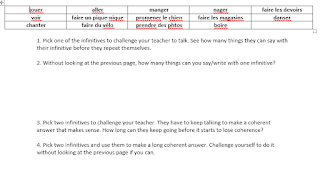We left the booklet at around page 12 in Part 3. With pupils using past tense "cheats" to write their stories. And seeing model stories in French using the imperfect to set the scene and the perfect to say what happened. This post will take us through some of the pages up to the end of the booklet, with pupils making up their own stories in speaking and writing.
We've seen that all the language and the activities have to be scaffolded, so that all Year 9 groups can use them successfully. We have seen that it builds on pupils' well established repertoire of French. We have seen that all new (or nearly new) language is integrated into their existing repertoire. And we have seen that learning to deploy their language is just as important as learning the language itself.
The first thing we do is get the verbs ready that we are going to need in the rest of the booklet. This is so we can do it methodically, working through the step by step process of choosing tense, type of verb, person of the verb to arrive at the correct ending. Then when pupils need them later, they know they have them ready. This is part of the way we use Food Tech or other Technology subjects as a metaphor for language-learning. Pre-prepping some of the tricky ingredients is familiar to pupils from Food Tech, as is the idea of then assembling the dish for the customer.
Here's the page for the verbs in the Imperfect. There is a grammar explanation and an accompanying powerpoint. Then the pupils prepare the exact verbs they are going to be needing later.
Then there is a double page working on the verbs in the Perfect. The explanation and examples on the left act as a guide to assembling the verbs they are going to need on the page on the right:
The page on the right contains the verbs they will be needing later in the booklet.
The first story to assemble is the Aquarium story. You may remember that the pupils read a version of this earlier in the booklet as a model. This can support them now, but it is worded differently so they can't just copy word for word.
They retrieve their imperfect and perfect verbs from the chiller cabinet and have them ready for when they are needed. Then they translate the story into French using their core repertoire, adding the ending saying what was happening and what happened using the the verbs they had ready.
They do exactly the same process again for a story about going to a museum. And for the unpleasant experience on a roller-coaster story you will remember from Part 3. But this time, they write the story in French.
By the end of the booklet, they are invited to select their own infinitives. They process them into Imperfect or Perfect, and make up their own stories in speaking and writing:
So by the end of Year 9, the pupils are producing answers which meet the GCSE criteria of: opinions, reasons, personal detail, past and future, and narration. We work on their ability to do this with increasing coherence, accuracy, confidence, independence and spontaneity. Having the core repertoire means new language sticks, and it helps with the development of a conceptualisation of grammatical structures. Most importantly, all the language they learn is language that they use. They have it at their fingertips and they are keen to learn more.







No comments:
Post a Comment